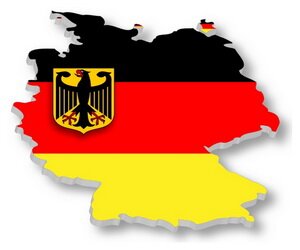
Yuriy Radkovets
Since the beginning of Russia's undeclared armed aggression against Ukraine in February 2014, one of the main and consistent allies of our country has become the Federal Republic of Germany. Thus, the German leadership firmly condemned the actions of V. Putin's regime against Ukraine, categorically and unequivocally refused to recognize Russia's annexation of the Ukrainian Crimea, and took an active position within the framework of work of the “Norman Group” to resolve the conflict in Donbas.
In terms of practical implementation of such policies, Germany, together with the United States took the lead in the introduction and consistent build-up of political and economic sanctions against the Russian Federation both, on the “Crimean issue”, and because of the Russian invasion of the eastern regions of Ukraine. At the same time, Berlin launched a great campaign of comprehensive assistance to Ukraine, including political, economic and financial support to our country, as well as providing it with individual types of military equipment and supplies.
In fact, it is the actions of Germany that became a key factor that helped prevent further expansion of Russia's military aggression against Ukraine and unite the European Union's efforts to counteract the Kremlin's expansion in Europe.
All this was due to Berlin's concern about actual destruction of the whole system of collective security in Europe and in the world, as a result of the unprecedented aggression of Russia against Ukraine. In fact Russia began and is now leading a full-fledged war — “hybrid” by form and “asymmetric” by content. The latter circumstance is perceived in Germany as a direct threat to the United Europe (EU) in general and to Germany in particular in the context of Moscow's attempts to revise the political system and the existing borders on the European continent. So, now it is no exaggeration to say that Berlin's main hopes for preservation of peace in Europe were assigned to Ukraine, as Germany's historical partner.
Yes, Germany and the German world have always played a special role in Ukraine's history. In particular, in the early Middle Ages it was Norman/Scandinavian (and in fact — German) knights that contributed to formation of Kievan Rus’ as a single centralized state. At this, Kievan Rus’ took a leading position in the civilized world of that time, and really saved Europe from the invasion of the Mongol-Tatar Golden Horde, which gave birth to the present-day Russia.
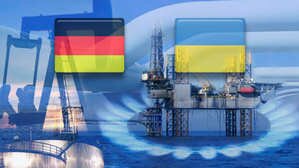 Later, in the modern and contemporary history, to Germany Ukraine has become a kind of counterweight to Russia in Eastern Europe, and also a deterrent of Moscow's expansion at Western (European) direction. This question had always been then and still is today exclusively important for Berlin in the permanent confrontation between Germany and Russia at all stages of the historical development of the two countries, as well as their relationship.
Later, in the modern and contemporary history, to Germany Ukraine has become a kind of counterweight to Russia in Eastern Europe, and also a deterrent of Moscow's expansion at Western (European) direction. This question had always been then and still is today exclusively important for Berlin in the permanent confrontation between Germany and Russia at all stages of the historical development of the two countries, as well as their relationship.
An important factor is economic interests of Germany in Ukraine, mainly in the agriculture and livestock sector in southern Ukrainian regions, as well as in heavy industry — in eastern Ukrainian territories. For example, in the 18th-19th centuries German colonists had been nesting actively in the Ukrainian Black Sea coast, and German capital had been invested massively into development of coal and steel industry in the Donbas, Zaporizhzhya and Yekaterinoslav (Dnipropetrovsk).
As part of implementation of the above-mentioned objectives which were fully consistent with the interests of the revival of Ukraine as an independent and sovereign state, Germany on its own and through its allies (especially Austria-Hungary) carried out a consistent policy of support to and implementation of the Ukrainian national idea.
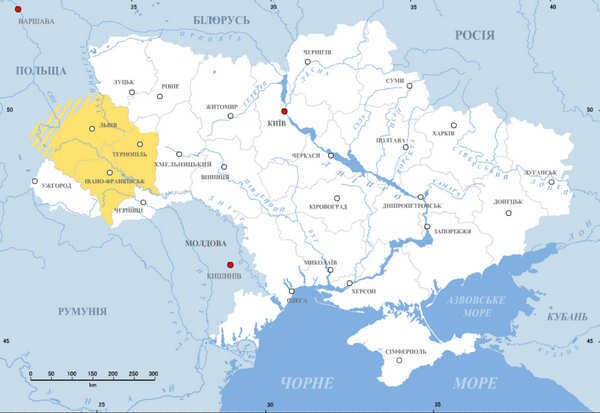
In fact, it is in the southeastern part of what was then the Austro-Hungarian Empire, the so-called Galicia, that the main cultural and historical heritage of Ukraine was preserved. Apart from this, Germany and Austria-Hungary supported national liberation movements in Ukraine, in particular the “Union for Liberation of Ukraine”. A separate support was to the Ukrainian church confessions of Western orientation — especially the Ukrainian Greek Catholic Church and Ukrainian Autocephalous Church.
Ukraine became especially important for Germany's interests before and during the First World War, which was the result of a pan-European and global crises that had global consequences for Germany and its allies — Austria-Hungary, Bulgaria and Turkey.
Taking into consideration the nature of the situation at that time, as early as November 1914, Germany and Austria-Hungary took a clear course for creation of an independent Ukraine as one of the main political goals in the war against the Russian Empire.
Implementation of these plans was carried out by the General Staff of the German army through both, national forces of Ukraine, and through antimonarchist movement in Russia — first of all, Communists (Bolsheviks), who situational associated themselves with all opponents of the tsarist regime in the country. At this, the German leadership was relying on its own political forces speaking for independence of all “non-Russian forces” of the Russian Empire.
Germany's support to Bolsheviks against the background of a sharp aggravation of general political and economic problems in Russia, contributed to the downfall of the tsarist regime and the Bolshevik Revolution in the Russian Empire in October (November) of 1917. The consequence of this was the collapse of tsarist Russia with emergence of several independent states on its territory. The main one was the Ukrainian People's Republic (UNR) — a new independent state, led by the Central Rada (the main legislative body) of Ukraine and its Head Mykhaylo Hrushevskyi — actually the first President of Ukraine.
At the same time, despite the declaration of a democratic course and the right of nations to self-determination, the new Russian Bolshevik regime, immediately after the seizure of power in the country went for Russian imperialism and chauvinism. Thus, in January 1918, the Bolshevik government of Russia headed by Vladimir Lenin declared war on the UNR in order to restore Russian control over Ukraine.
Despite ideological differences, the Bolsheviks' neo-imperial goals were supported by Russian chauvinists and monarchists, some of which had come over to the side of Lenin's Bolshevik Party. This allowed the Bolsheviks to form an army to invade into Ukraine, led by former Captain of the Tsar army M. Muravyov.
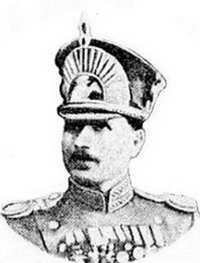 Note: M. Muravyov was promoted lieutenant colonel by A. Kerenskiy; in 1907 he joined B. Savinkov's Left Socialist-Revolutionary terrorist group; In 1917 he came over to the Bolsheviks and was appointed Commander in Chief of the Petrograd Military District; later — the Commander of the Forces at Kyiv direction and the Commander of the Eastern Front /at the beginning of 1918/; July 11, 1918 M. Muravyov was shot dead by the Bolsheviks on Lenin and Trotskiy's personal order as a traitor and an enemy of the people.
Note: M. Muravyov was promoted lieutenant colonel by A. Kerenskiy; in 1907 he joined B. Savinkov's Left Socialist-Revolutionary terrorist group; In 1917 he came over to the Bolsheviks and was appointed Commander in Chief of the Petrograd Military District; later — the Commander of the Forces at Kyiv direction and the Commander of the Eastern Front /at the beginning of 1918/; July 11, 1918 M. Muravyov was shot dead by the Bolsheviks on Lenin and Trotskiy's personal order as a traitor and an enemy of the people.
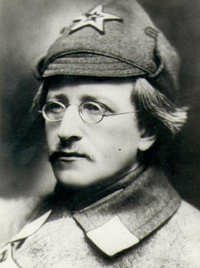 and under the Party (Bolshevik) supervision of the former Tsar's Lieutenant V. Antonov- Ovsiyenko
and under the Party (Bolshevik) supervision of the former Tsar's Lieutenant V. Antonov- Ovsiyenko
Note: in 1910 he joined the Mensheviks; in 1917 he moved to the side of the Bolsheviks; actively participated in the establishment of Soviet power in actually all regions of Ukraine, in the formation of the USSR armed forces, military operations against the army of the Directory, the elimination of the Grigoriev's uprising /Kherson Province, May 1919/; he participated in the suppression of the Tambov uprising /1920/; then was at diplomatic work in Czechoslovakia, Lithuania, Poland and Spain; February 10, 1938 was shot dead as a spy and enemy of the people).
Unfortunately for Ukraine, in this situation, the short-sighted policy of the leadership of the Ukrainian People’s Republic, who had actually disbanded the Ukrainian army, counting on friendship with Russia, deprived the UNR of real possibilities to counter the military aggression on the part of the Bolshevik government in Moscow. At this, apart from direct military intervention into Ukraine, Russia actively used methods of the so-called “hybrid warfare” in the organization of mass support for pro-Russian forces and their subversive activities on Ukrainian territory, and in terms of loosening the foundations of the young Ukrainian state.
In the absence of sufficient forces in the UNR to oppose the Bolsheviks (in fact — the units of the regular Russian army used to its advantage by the new Russian government), they managed to occupy a large part of Ukraine by February 1918.
But this time, Germany did not allow Moscow to implement its plans. Under the threat of a German invasion, which would have meant inevitable collapse of the Bolsheviks regime, at the beginning of February 1918 V. Lenin was forced to go to the so-called Brest-Litovsk Treaty with Germany and its allies. The document, signed with the participation of representatives of the Central Rada, provided for recognition of the UNR by Germany, Austria-Hungary, Turkey, Bulgaria and Russia, the withdrawal of Russian troops from the Ukrainian territory, as well as Berlin and Vienna's military assistance to Ukraine.
In line with this agreement, the German-Austrian military contingent of about 450 thousand men was placed on the Ukrainian territory. This allowed to free Ukraine from the Russian-Bolshevik troops, to stabilize the situation in the country and to ensure protection of its borders.
In the future, the German administration helped to strengthen the statehood of Ukraine by transformation of rather amorphous UNR without strong leaders and specific national goals into the so-called Hetmanate led by P. Skoropadskyi. In spite of the present problems, it is that government that was the first truly independent government of Ukraine with all legislative and executive bodies and functions.
Unfortunately for Ukraine, at that time revolutionary processes also embraced Germany itself and led to its defeat in World War I and surrender to the Entente countries. November 4, 1918, German sailors captured the city of Kiel and the warships in its port. The next day, the insurgent workers, sailors and soldiers of rear garrisons that joined them captured Lübeck, Hamburg, Bremen, and other cities of Germany. A revolution began, and November 9, 1918 the monarchy was overthrown in the country.
In this situation, the new leadership of Germany itself began peace talks with Western opponents. The agreement was signed November 11, 1918, and involved complete disarmament of Germany, as well as withdrawal of German troops from all foreign territories, including Ukraine. At this because of their own interests, France and other Western countries refused to support Ukraine's independence, and in fact were on the side of Moscow.
In the context of post-revolutionary instability in Ukraine, all this had led to chaos on the Ukrainian territory and as a consequence — Hetmanate fell, instead of it to power came the so-called Directory led by incompetent people, anarchists and adventurers. Russia immediately took advantage of all this, and launched a new intervention into Ukraine as early as January 1919.
In February 1919, Kyiv was captured by the Bolsheviks for the second time, which finally plunged Ukraine into the abyss of a large-scale civil war. As a result — Ukraine lost its statehood, and for long 70 years had been under Russia's control in the USSR.
At the same time, as a result of the armed conflict on the territory of Ukraine and further repressions by the Bolsheviks, as well as forced collectivization and Holodomor (1932-1933), organized by Moscow, more than ten (according to other sources — more than twelve or fifteen!) million Ukrainians were killed.
The only state, which condemned the Holodomor, was, strange as it might seem, the National Socialist Germany, about it in their speeches repeatedly spoke its leaders, which led to strong protests of the official Moscow. Thus, in 1935 at the Congress of the National Socialist Workers' Party of Germany, the Minister of Education and Propaganda J. Goebbels uttered his famous speech “Communism without a Mask”. Having read it (it is available on the Internet), one can personally make sure that Germany already then recognized the terrible crime of the Bolshevik regime in relation to the Ukrainian people.
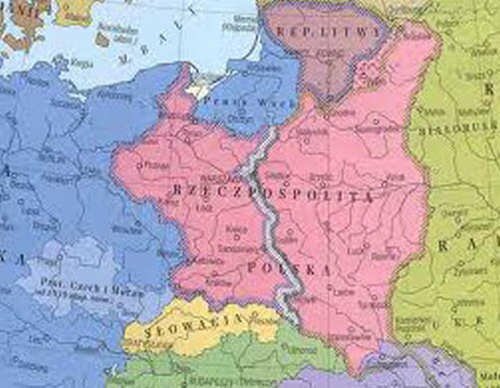
August 23, 1939 the Non-Aggression Treaty between the USSR and Germany (the “Molotov-Ribbentrop Pact”) was signed in Moscow. The secret addition to the Pact was a Protocol on division of Soviet and German spheres of influence in Eastern Europe. According to the Protocol, to the Soviet sphere of influence were added: Western-Ukrainian lands from Poland and the lands inhabited by Ukrainians in Southern Bessarabia. Northern Bukovyna's going into the sphere of interests of the USSR was determined by the secret Protocol to the new Soviet-German “Treaty on Friendship and the State Border” from September 28, 1939.
Taking advantage of the German attack on Poland, the Red Army September 17, 1939 crossed the Soviet-Polish border. Almost without meeting resistance, Soviet troops seized the lands inhabited by Ukrainians, but stopped at the border of ethnic Poles settlement. Officially, the Soviet leaders explained this step by the need to prevent the Nazi occupation of Western Ukrainian and Western Belarusian lands. Nevertheless, such actions meant the Soviet Union's actual entering World War II.
To constitutionally legalize Western Ukraine's becoming part of the USSR, elections were held for the People's Assembly of Western Ukraine. October 27, 1939 the National Assembly adopted a decision to join the Soviet Union and on inclusion of the Western Ukraine into the USSR. In November 1939, this decision was confirmed by the Supreme Soviet of the USSR.
This way, most Western Ukrainian lands (except Zakarpattya and Holm, Podlasie, Posyannya, Lemkivshchyna), as well as Northern Bukovyna and Southern Bessarabia were added to the Soviet Ukraine. On the newly acquired lands, Stalin's government holds radical political, socio-economic, cultural transformations aimed at establishment of the Soviet system.
Accession of the territories was a direct consequence of the signing of the Molotov-Ribbentrop Pact with a secret Protocol to it, the beginning of World War II and the German-Soviet occupation of Poland. The annexation led to a drastic increase in the territory and population of the Ukrainian SSR, including at the expense of the territories (Galicia), which had never been part of the Soviet Union or the Russian Empire. It would seem that Ukraine had lost its chance to become an independent state.
Ukraine got another chance to gain independence during the Second World War, again with the help of Germany. Thus, in March 1941, one of the political goals of Germany's war against the Soviet Union, as an act to prevent Stalin's invasion of Europe, was determined creation of an independent Ukrainian state. In particular, it was provided for by the German plan “Barbarossa”, which included “dismemberment of the Soviet Union into independent states with their own governments, with which it was possible to achieve peace”.
Contrary to the moods of a significant number of residents of western regions of the Soviet Union (including the Baltic States, Ukraine, Moldova and Belarus, and Russia itself), who saw the German troops as liberators from the Bolsheviks, Hitler refused to grant political independence to these peoples of the USSR. Moreover, all attempts to create national authorities in the occupied territories were rigidly suppressed, and against activists of independent from Hitler's regime national movements were launched large-scale repressions.
For example, immediately after the declaration of Ukrainian state June 30, 1941 in Lviv, the Gestapo arrested nearly all the initiators of this act, including the leader of the Organization of Ukrainian Nationalists (OUN) Stepan Bandera and his associates. Later, the German occupation authorities were strongly against other efforts to establish independent Ukrainian organizations. At this, their members were arrested and liquidated along with pro-Soviet activists, partisans and underground fighters.
In August 1941, completely ignoring the Ukrainian people's aspirations, Hitler ordered to divide Ukraine into separate administrative entities — Reichskommissariats that, in fact, put an end to the idea of its national revival under German protectorate. In fact, the use of Ukrainian potential in the fight against Russia was limited by Berlin to just using individual military, paramilitary and police units from among ideological opponents of the Soviet power, as well as a few fully controlled by Germany, political organizations and media.
In conjunction with Hitler's regime's starting repressions against the civilian population, in response to Moscow's intensification of partisan movement in Ukraine, all this has led to the emergence of a completely different situation — disregard to Germans by most of the Ukrainian population. Both, nationalists and pro-Soviet-pro-Russian forces in Ukraine were combating with weapons against Germans.
After the defeat of the German army at Stalingrad in the winter of 1943, that, in fact, was a turning point in World War II, Germany tried to change its positions. However, it was too late. The outcome of the war was already determined, and Russia, in its turn, received the status of a great world power, later becoming “Evil Empire” and a threat to the whole western civilized world.
At the same time, one way or another, but the Second World War, as well as Germany's influence on Ukraine, became a powerful stimulus of formation of the national liberation movement in Ukraine. In its active (including the armed) phase, this movement lasted until the beginning of 1990s, having created the basis for the current sovereign Ukraine.
Ukraine's gaining independence in 1991 (after the collapse of the Soviet Union) resumed preconditions for the development of the German-Ukrainian relations. This issue reached a new level of relevance for Berlin when in Russia V. Putin came to power, who moved from a policy of mutually beneficial cooperation with the West to confrontation with the European Union and NATO/USA.
Following this course, February 20, 2014, Russia began a military aggression against Ukraine, which led to destruction of the existing system of collective security in Europe and worldwide, established after World War II. First of all, it concerns the violation of the basic for all principle of the Helsinki Agreement on the Inviolability of Borders of the Sovereign States, as well as the UN Principles on the non-use of force to settle disputes between member countries of the Organization.
All this was seen by the EU and NATO/USA as a real threat from the Russian Federation, which objectively demanded their adequate actions. First of all, this situation touched Germany, which again turned out to be at the forefront of Russia's confrontation with the West. This fact returned Germany onto the path of active support to the national independence, sovereignty and territorial integrity of Ukraine as an important deterrent of V. Putin's regime.
Unfortunately, this factor again cannot find a full and unconditional support of the entire European community, including a number of political forces and even certain German politicians.
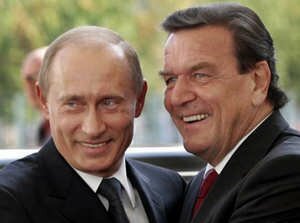 Thus, V. Putin's main ally in Germany is the energy lobby headed by former Federal Chancellor Gerhard Schroeder. Besides, Russia's policy towards Ukraine is supported by a number of German left-wing parties. On the lifting of the sanctions against Russia insist also individual political — business circles of the EU (including the representatives of large business in Germany), interested in resuming normal trade and economic relations with Russia.
Thus, V. Putin's main ally in Germany is the energy lobby headed by former Federal Chancellor Gerhard Schroeder. Besides, Russia's policy towards Ukraine is supported by a number of German left-wing parties. On the lifting of the sanctions against Russia insist also individual political — business circles of the EU (including the representatives of large business in Germany), interested in resuming normal trade and economic relations with Russia.
Similarly — in support of Russia against Ukraine — are pro-Russian and anti-Ukrainian ultra-nationalistic and Euroskeptic (isolationist) parties in Germany and in other European Union's countries. Among them a special place is occupied by the “National Front” and the “Left Front” in France, “SYRIZA” in Greece, “Forza Italia” in Italy, “Jobbik” in Hungary, as well as “The New Right” and the so-called “Kresowy” (local /regional/nationalist) organizations in Poland.
 At the same time, the Federal Republic of Germany and its Federal Chancellor Angela Merkel are consistent in standing up against Russian expansionism and irrationalism.
At the same time, the Federal Republic of Germany and its Federal Chancellor Angela Merkel are consistent in standing up against Russian expansionism and irrationalism.
Thus, December 14, 2015 German Chancellor Angela Merkel supported the maintenance of sanctions against Russia. She made her statement during Congress of the Party of the Christian Democratic Union in Karlsruhe. According to her, for the EU it was the right decision — in international negotiations to demand compliance with a peace order in Europe, and to impose sanctions on Russia, which can be lifted only after the fulfillment of the Minsk Agreements.
A. Merkel pointed out that it was a joint decision of the European Union countries. “I think it was the right response, no matter how much we would like to have good relations with Russia. Our principles must be observed”. Besides, A. Merkel stressed that the peoples' right to self-determination should exist not only on paper.
So, Ukraine has long been seen by Germany as one of the main partners in the East of Europe and it has always stood for Ukrainian statehood and sovereignty. The existing modern contradictions in the European Union, including in Germany, have been actively supported and used by Moscow for its own purposes — to break up the EU, to break through the isolation of Russia from Western countries and international organizations, as well as to convince some of them to lift the sanctions against the Russian Federation.
At the same time, Germany's clear and consistent policy led by the Federal Chancellor A. Merkel, allows to keep the unity of the European Union in its attitude to Putin's regime. This forms a powerful deterrent to Moscow's expansion to a united Europe, as well as a preconditions for resolving the situation around Ukraine and restoration of its territorial integrity as a pillar of strengthening security and resumption of stability in Europe.

